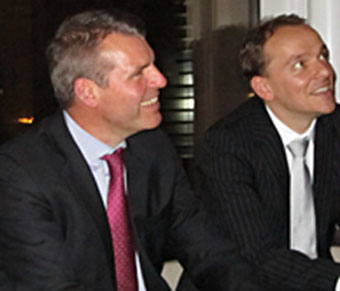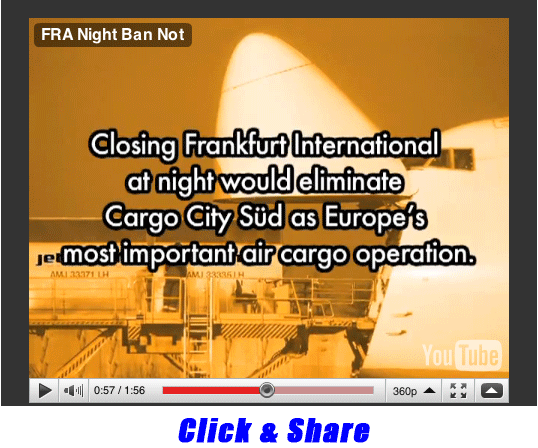
A late November snow fell gently on the
tree branches and rooftops of Frankfurt yesterday, dusting the landscape
with a light sugar coating and recreating the ancient image of Germany
approaching Christmas.
It may be a bit early yet to start singing
Stille Nacht although the traditional Christmas Market is in full swing
here, but one look around the countryside explains how that most treasured
of traditional verses came to fruition.
For Lufthansa Cargo, another tradition that
has continued now for several years is the pre-Christmas, year-end gathering
of several members of the press, as the fourth estate gets a look back
and ahead titled, ‘Meet The Trends’
from Dr. Andreas Otto, Executive Board Member Product and Sales.
While the gatherings are inspired by the
business, the season is not overlooked.
Planners in past years have held this event
is various ways – as a “make-it-yourself-dinner” one
year, and as a evening in a storied castle on another.
For 2010, the ‘Meet The Trends’
venue was The Skylounge of Roomers Hotel, which is located in downtown
Frankfurt in the financial district.
Roomers Frankfurt is part of a chain of
boutique hotels where modernist designers hold sway, combining form and
function in sleek venues.
It’s all gee-whiz stuff, including
a Spa and Gym, where work out and beauty treatments are conducted in spaces
where management collaborated with big name designers and even biorhythm
architects.
The Lufthansa gathering in Skylounge, with
floor to ceiling windows, offered a stunning view of The Main River and
the surrounding bank district from an elevation where you can see plenty
of detail.
‘Meet The Trends’
offered some revelations and solid news.
Summing up the carrier's current position
in the air cargo business in late 2010 as the world financial crises continues
to fade, Andreas Otto said:
“I guess we are a crises winner.”
Dr. Otto revealed that members of Lufthansa
Cargo’s Supervisory Board will be presented a list of additional
freighters when they come together in their regular meeting next March.
“Since we grow at least with the market,
we need a freighter capacity of up to six more MD-11Fs, or equivalent
cargo planes, by 2015,” he exclaimed.
Currently, the German cargo carrier’s
fleet is comprised of eighteen MD-11Fs, one down from the original nineteen
after a recent crash in Riyadh, which left one aircraft fully destroyed.
In his presentation, however, Otto didn’t
reveal which freighter model his airline was favoring.
It could either be six MD-11s, five B777Fs
or some passenger-to-cargo converted aircraft.
Also undecided is the future production
platform of the aircraft, which ultimately doesn’t have to be LH
Cargo itself but could also be AeroLogic or Jade, both members of the
Lufthansa Cargo Group.
“We are currently evaluating all pros
and cons before we opt for a certain freighter model for further fleet
growth,” stated LH Cargo’s speaker, Michael Goentgens.
The recommended capacity push is needed
since the German Cargo Crane forecasts an annual increase of tonnage by
five percent on average until 2015.
On major trade lanes such as Europe-Asia,
volumes are expected to leap seven percent per year.
On the way back from Asia to Europe, six
percent stand on manager Otto’s chart.
Roundtrips Europe to Africa to Europe account
for five percent both ways, whereas Europe-North America falls way behind
average with an annual plus in tonnage of only two percent until 2015.
As far as network changes are concerned,
Otto announced twice weekly service to Manaus at the Amazon River as of
January 24.
 His airline will be the first and only cargo
carrier from overseas landing at this Brazilian city. The flights will
be routed via Viracopos airport near Sao Paulo.
His airline will be the first and only cargo
carrier from overseas landing at this Brazilian city. The flights will
be routed via Viracopos airport near Sao Paulo.
Looking beyond the horizon, LH Cargo predicts
an average yearly volume growth of 4.6 percent in the decade between 2016
and 2026.
“In our market and growth estimation
we included major down and upturns of the air freight biz that might happen
within that time period,” says Goentgens.
Major divergences from this prognosis are
therefore unlikely to happen.
Next on the carrier’s agenda stands
a memorandum of understanding that will be signed between LH Cargo executives
and the management of Hyderabad’s Rajiv Gandhi International Airport
in central India on Friday this week.
The carrier’s biggest hub on the planet
for pharmaceuticals and generics is going to be established at that site.
“Hyderabad is becoming our biggest Asian hub for pharmaceuticals,”
exclaimed Herr Otto.
In his presentation he stressed that India
has swung itself up to become the world’s largest producer of generics.
That’s the main reason why his airline
will base a fleet of cooling containers and personnel there in the coming
months.
These efforts are welcomed and supported
by the airport authorities who this coming Friday will announce construction
of a state-of-the-art warehouse containing different rooms for a broad
variety of temperature sensitive air freight products.
 A
similar project will be realized in Frankfurt, where LH Cargo plans to
build a cold-storage facility of 4,500 square meters within its own Cargo
Center in the northern part of Rhein-Main airport. A
similar project will be realized in Frankfurt, where LH Cargo plans to
build a cold-storage facility of 4,500 square meters within its own Cargo
Center in the northern part of Rhein-Main airport.
The exact expenditure was not revealed,
but Lufthansa Cargo’s head of communications Nils Haupt spoke of
a euro amount “in the upper single digit millions.
The construction work in Frankfurt is scheduled
to begin next spring, with the inauguration expected to happen sometime
in fall 2011.
Pharmaceuticals are currently going through
Lufthansa Cargo’s roof, manifested by an increase of 35 percent
in 2010 year-on-year.
“They are crisis resistant and very
profitable,” praises speaker Goentgens of pharma.
Otto concluded the press meeting by announcing
that the initiative “Air Cargo Needs the Night” won more than
one hundred enterprises as active supporters from the logistics and other
industries.
In addition, more than 10,000 people followed
a call for maintaining adequate night-flight regulations at major German
airports.
These flights are at stake since a number
of courts have recently decided to restrict flying between midnight and
early morning at major domestic hubs, or have placed high obstacles for
night operations.
The results of the initiative will be presented to Germany’s Transport
Minister Ramsauer at an Aviation Summit in Berlin today, Tuesday, November
30.
Summing up his feelings of the future as
2011 approaches, Dr. Otto said, "we are facing challenges, however
compared to previous years and coming out of the worst financial crisis
in history, when things were uncertain, right now I have never been more
confident about the future. All signs are positive."
Heiner/Geoffrey. Edited by Flossie
|




